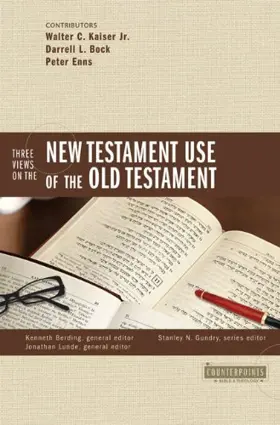

Three Views on the New Testament Use of the Old Testament
Pages
256
Publisher
Zondervan
Published
11/1/2008
ISBN-13
9780310273332
This book in the Counterpoints: Bible & Theology series introduces three approaches presently employed in the study of the uses of the Old Testament in the New Testament, especially in those instances where the New Testament authors discern the fulfillment of a prophetic element in the Old Testament text. The foundational issue concerns the relationship between an Old Testament author’s meaning and the meaning of that same passage when it is used by a New Testament author.
Reviews
Kaiser, Walter C., Jr., Darrell L. Bock, and Peter Enns; edited by Kenneth Berding and Jonathan Lunde Three Views on the New Testament Use of the Old Testament Counterpoints: Exploring Theology Grand Rapids: Zondervan, 2008. Pp. 256. Paper. $16.99. ISBN 0310273331. Steve Moyise University of Chichester Chichester, United Kingdom This book is part of the Counterpoint series, which intriguingly includes Five Views on Law and Gospel, Four Views on Hell, but only Two Views on Women in Ministry! This topic warrants three views, and they are provided by Walter Kaiser, Darrell Bock, and Peter Enns. The book begins with a helpful overview of the topic by one of the general editors (Jonathan Lunde), who draws attention to five orbiting questions that can be summarized as follows (1) Are the concepts of sensus plenior and typology a helpful way of explaining the New Testament use of the Old Testament? (2) What role did either the original Old Testament context or contemporary Jewish exegetical tradition play in the New Testament use of the Old Testament? (3) Does the New Testament use of the Old Testament provide a model for our use of the Bible? Each author is then given about forty-five pages to outline his view and respond to these questions, followed by a seven- to eight-page response by the other two authors. The book ends with a summary by one of the other general editors, Kenneth Berding. Kaiser’s views are well known and can be distinguished from the other two in terms of method. For Kaiser, the New Testament authors were careful exegetes who used the same sort of historical-grammatical methods as we do.
[Full Review]
